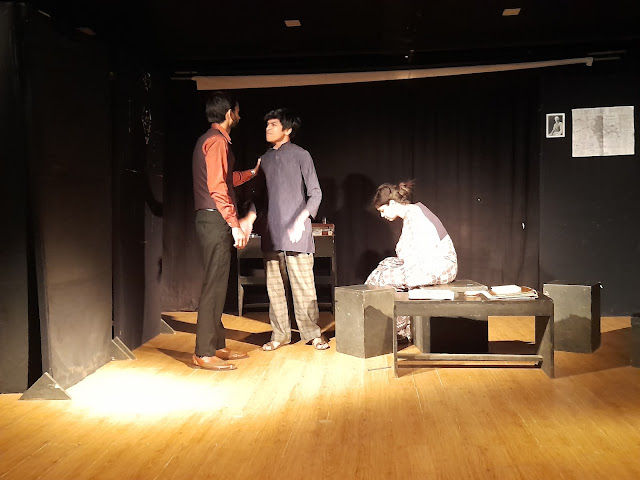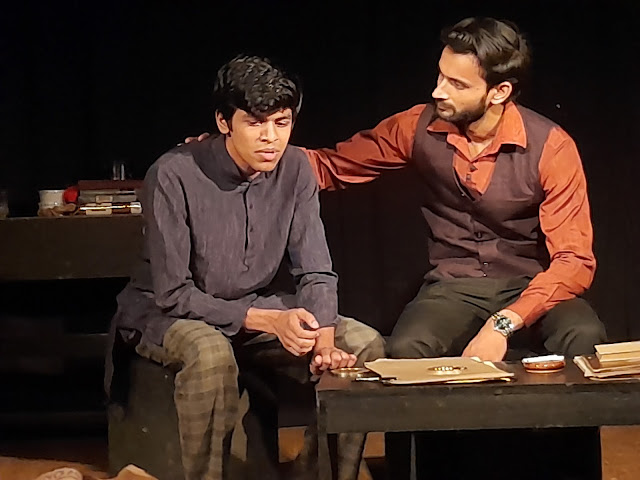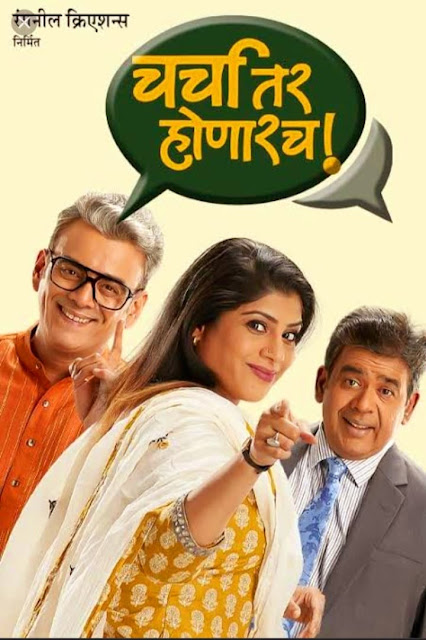What is the aim of life other than dying?
( हिंदी में समीक्षा के लिए - यहाँ क्लिक करके क्रम सं. 22 देखिए )
The play looks purposeless movements of actors and you get annoyed to the brim.
There is nothing more than mundane banality in it and you get a good dose of annoyance and irritation.
The striking fact is that howsoever absurd it may look, this is the true replica of the life of today in everyone's own world.
As of now I have seen a number of absurdist plays in Mumbai. Almost in all of them I found: One, nobody is caring to anybody even not to himself. Second, a pray for little favour is made by a weak person and it is willingly ignored by the influential character up to the end of the play (and perhaps after the end also if you could see). And the repulsive forces of persistent anomalies dishearten viewers but they are never distracted as they are actually watching the most authentic version of contemporary human life on global level.
The tragedy lies not in the circumstances but the fact that no one wants to get out of it. All are trapped in their banalities bereft of human values. All are together but without a bond. There is hardly an eye contact between the characters and everyone is lost in himself. Even while Rajshekhar and Julie see each other they are seeking their own goal - carnal pleasure by one side and economic security by the other side.
Rajshekhar is a tycoon having multi-crores business of civil construction contracts. He has a pet tiger named as Sultan. The tiger is never seen on the stage but his roar is heard throughout the play as if he is talking to his master Rajshekhar. His sound sleep is broken by a phone ring in which he gets the alert that there is a shortfall of 3000 bags of cement and there are only 7000 bags. He instructs to make these 7000 bags content to that of 10000 bags. This unscrupulous act of himself is defended by himself " What the hell if the building collapses and thousands of people die. After all the ultimate aim of life is dying only and I am helping them out to achieve their goal early." Suddenly he gets a strong attack of body pain along with an unbearable headache. He shouts to call his doctor who appears and helps him out by giving a dose of morphine. The moment Rajshekhar gets some relief he lashes out on the doctor that he has been hired to get him out of drug addiction and not to serve it.
Rajshekhar asks the doctor if he is at peace with his life which is answered in an affirmation. On this he dials to the hospital and instructs them to discharge the wife of his attendant doctor immediately who is in the terminal stage of her cancer. After this the attendant doctor is never at peace and remains extremely restless as he know the moment his wife is discharged from the hospital she will die. Then the family priest appears with his preaching of peace and happiness ever. The motive of the priest is to get donation of Rs. 5000/- and in response to it he gets that of Rs. 10,00,000/-. The peace of the priest goes away at that moment and then after he remains in a state of ecstatic lunacy. Then comes Julie, the beloved of Rajshekhar. She is pregnant of the child of Rajshekhar and wants to marry him. For some while, Rajshekhar plays with her sweet will and then suddenly get morphine injection administered to her by the doctor. The morphine has already been served to the priest to pacify him from the economic ecstasy. The phone rings again and it is known that the doctor's wife is dead. The doctor is hot under the collar over Rajshekhar and wants to kill him. But, Rajshekhar consoles him saying that she was dead before her discharge. Then Rajshekhar himself administers morphine injection to the doctor and then he shoots his loving pet tiger Sultan. In the end he shoots himself.
It is worthy to mention here that the cheque of Rs.10 lakh which made the priest mad was not signed.
The picture frame kept falling from the wall intermittently throughout the play.
The play originally written in Marathi language by Mahesh Elkunchwar had been presented in Hindi by Darakht Theatre Co and was directed by Lokesh Verma. The actors were Devanshi Chaudhary ( Julie), Kashish Anand (Rajshekhar), Nishant Bajaj (Doctor) and Akshay Prajapat (Priest). Valuable backstage supports were from Sound Design (Lokesh Varma), Light Design (Mohit Popli) and Production Manager (Mehak Chopra). The Design & Direction was by Lokesh Varma.
Akshay Prajapati influenced everybody with his spiritual aura and a comical madness over unbelievable economic gain. Kashish Anand was able to show the state of a man trapped in menacing maze of unhappiness. Whereas the accent of Akshay carried an air of pseudo-serene peacefulness, Kashish was also in perfect shape of full vigour of ego trampling all of his own scruples. Devanshi Chaudhary tried her best to present a tough synthesis of love and selfishness and succeeded to some extent. Nishant Bajaj displayed a good show of restlessness whose wife's last some hours of life was being snatched by the cruel master.
There was no charm, attraction or happiness in any manner in dialogue, body-movements, dress-sense or set-design that goes well with the core theme of absurdism.
The play leads you to a cul-de-sac and seems to lose the meaning of purpose perfectly. But viewers, just see the volte-face of it. And this is where the playwright intends you to go.
A good show by Darakht Theatre Co!
........
Respond to - hemantdas2001@gmail.com / editorbejodindia@gmail.com
Link of other Drama-reviews: Click here























































